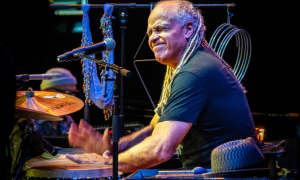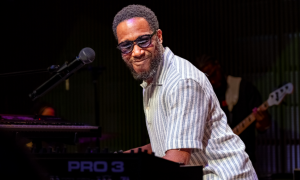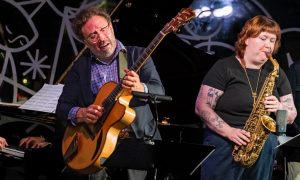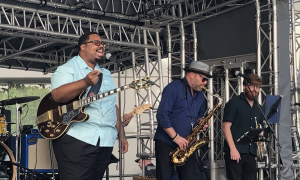Home » Jazz Articles » Live Review » Detroit Jazz Festival 2022: The 43rd Edition Returns to ...
Detroit Jazz Festival 2022: The 43rd Edition Returns to a Live Audience

Courtesy Detroit Jazz Festival
Hart Plaza and Campus Martius
Detroit, MI
September 2-5, 2022
The main lobby of the Detroit Marriott at Renaissance Center was abuzz with greetings and joyful conversation. You could feel the ardent positivity in the room as well as you could feel the near ninety-degree heat and accompanying steady breeze just outside, along the Detroit Riverwalk. A quick glance around the room revealed festival resident artist

Chucho Valdes
pianob.1941

Brian Lynch
trumpetb.1956

Hilario Duran
piano
John Beasley
pianoThe 2022 Detroit Jazz Festival represented in so many ways, a return to normalcy after the socially isolating onslaught of the Covid- 19 pandemic. Indeed, this lobby was the center of activity for the 2021 edition of the festival, the Marriott representing the totality of the festival territory itself. Two weeks before the festival would return to a live audience, the Delta variant set the planet back to social isolation once again, with festival directors deciding to pull the event back into a streaming only format. The musicians came to Detroit and performed live on soundstages constructed in the hotel's three ballrooms. The skills acquired streaming the 2020 festival allowed the quick and almost seamless transition to a broadcast format, a remarkable feat all things considered. Only a handful of journalists and photographers would actually attend in person, along with soundstage staff.
The Detroit Jazz Festival is the largest free jazz festival in the world, annually attracting 300-500 thousand fans to witness world class performances on four stages in downtown Detroit. With the festival in a streaming-only, digital format the past two years came the realization that in 2022 the music could simultaneously be streamed and performed before a live audience, increasing exposure from the aforementioned, historic in-person levels by at least the 2021 streaming audience of 2.5 million fans. The skills acquired out of necessity in '20 and '21 would facilitate a huge positive for the event moving forward. Viewers and listeners around the world could now join the live audience in Hart Plaza and Campus Martius in Detroit, feeling the unique urban vibe of this great city of music.
The festival would be streamed for free at DetroitJazzFest.org, with the performances from the Carhartt Amphitheatre streamed on the festival YouTube page. Performances from Campus Martius would be broadcasted on the festival's Facebook page. Festival President and Artistic Director, " data-original-title="" title="">Chris Collins said that allowing the festival to be accessible to audiences beyond Detroit is key to maintaining the mission to remain the world's largest jazz festival that is free to attend.
"For 43 years now, the festival has focused on being free to attend," Collins told the Detroit Free Press. "I once asked Gretchen Valade, the chairperson of our board who is also a major donor to our festival, 'Is there something I can do for you?' It was around Christmas and I saw people giving her gifts, and I asked, 'What can I do for you?' And she looked at me very clearly, and she said, 'Chris, keep the festival jazz—real jazz —and keep the festival free.' And I was so touched by that answer. When you look at the nearly two and a half million viewers we've built over the last two years and the millions who come with Qwest TV and the 325-530,000 people live and in-person in downtown Detroit... however you choose to experience the festival, you will be part of one of the largest single jazz audiences in the world. It's historic."
While much of the festival's selection of Valdes to headline this year's event is based on his association with Mack Avenue Records, his inclusion was a perfect match in many ways. The sheer joy of his music reflected the vibe of the audience as it gathered for his opening-night performance. "The Creation" is a piece that digs deep into the connection between African rhythms and the music of his native Cuba. In turn, Valdes connects the dots between Afro Cuban music and the blues/jazz tradition seamlessly to lead his audience to the realization of the unbroken ties that bind Black American musical forms as one.
In waiting on arrival, audible ads for Mack Avenue were heard on a loop. A parade of donors were introduced to the audience to the extent that the performance was delayed by nearly a half hour—a reminder of what must be done to keep the festival free. While initially a bit overbearing, a glance at the smiling faces, the joyous social interaction in the crowd put any of those concerns to rest. Generosity in both the private and corporate sectors of the jazz community is what facilitates free gatherings such as this.
Valdes appeared onstage dressed all in white, his trademark Rangor cap in place. The Yoruban Orchestra included a union between Latino and Detroit musicians, built around his touring quartet.
The ensemble achieved the aforementioned fusion of sound, a thrilling combination of brilliant writing and skillful arrangements. Soloists spanned the entire band, highlighted by a spirited collective improvised solo by a trumpet section that included notables

Brian Lynch
trumpetb.1956

Keyon Harrold
trumpet
Etienne Charles
trumpetb.1983
If jazz is about freedom, as it is often said, then the gathering that began with this performance must be seen as born in freedom as well. Freedom is what allows us to gather, what allows artists to create and witness beauty as an integral element of humanity. With the shutdown that accompanied the Covid-19 pandemic, that freedom became more elusive. Somehow, the international jazz community, and certainly the Detroit Jazz Festival, found a way through the darkness into the light. The inclusion of live in-person performances has torn open that small aperture that allowed us to see the light over the past two digital years, pushing the darkness aside.
Saturday, September 3: Day Two
Day two began with Detroit based performances in the early afternoon, followed by headliners Julian Lage,
Donny McCaslin
saxophone, tenorb.1966

Vijay Iyer
pianob.1971

Abdullah Ibrahim
pianob.1934
The downtown JP Morgan Main Stage sits in Campus Martius Park, surrounded by tall, vintage buildings. Drummer/composer/arranger Marc Lipson was first to perform there at 2pm Saturday, leading the Detroit Composers Collective. The collective is a Detroit group dedicated to recording, performing and archiving original music by Detroit artists.
The local scene was presented at Hart Plaza in the afternoon as well, with another drummer,

Keith Hall
drums
Betty Carter
vocals1929 - 1998

Curtis Stigers
saxophone
Janis Siegel
vocalsb.1952

Steve Wilson
saxophoneb.1961
The New Orleans Groove Masters, a band led by a trifecta of drummers, added to the already prominent contributions from that particular canon of music from the Crescent City. Drummers

Herlin Riley
drumsb.1957

Shannon Powell
drums
Jason Marsalis
vibraphoneb.1977
As the sun began to peak below the horizon of tall buildings to the west, the perfectly matched trio led by guitarist

Julian Lage
guitar, electric
Jorge Roeder
bass, acoustic
Dave King
drumsb.1970

Grateful Dead
band / ensemble / orchestrab.1965
The

Ambrose Akinmusire
trumpetb.1982

Harish Raghavan
bass
Sam Harris
bassb.1986
Timothy Angulo
drumsDrummer/composer/arranger

Ulysses Owens, Jr.
drumsb.1982

Kurt Elling
vocalsb.1967

Christian McBride
bassb.1972

Luther Allison
pianob.1939
Phillip Norris
bass, acoustic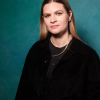
Nicole Glover
saxophone, tenorb.1991

Sarah Hanahan
saxophone, alto
Michael Dease
tromboneb.1982
Walter Cano
trumpet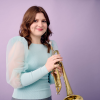
Summer Camargo
trumpetb.2001
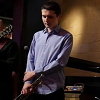
David Sneider
trumpet
Marquis Hill
trumpetb.1987
Saturday night's activities continued at the noted jazz spot, Cliff Bell's, unofficially until 3 am. The jam session there that began at midnight, personified a city on the comeback trail, and a stark difference to the past two years in which the festival was streamed, and the clubs were temporarily shuttered due to the pandemic. Many young players from the Ulysses Owens band were there, the long line of horn players waiting their turn extending down the entirety of stage left and then some. Veteran bassist

Rodney Whitaker
bassb.1968
Sunday, September 4: Day Three
The story for day three was the rain—not in the sense of it hindering the festival in any form or fashion, but in the Detroit audience pushing through, refusing to allow it to put a damper on their enthusiasm. For the most part, it was a light rain, with a bit of fog. Stages were covered and fans found refuge under trees, under umbrellas, or in indifference, seeing it as a refreshing change from the ninety-degree heat the previous afternoon. By six o'clock the rain had completely subsided, with a stout breeze blowing in off the river,Early in the afternoon, Detroit's Michael Jackson did his best Leonard Feather in hosting the Downbeat Blindfold Test with

Jason Marsalis
vibraphoneb.1977

Stefon Harris
vibraphoneb.1973

Bill Frisell
guitar, electricb.1951

Thomas Morgan
bass, acousticAs the light rain fell, the trio played around a common center, notes darting between the raindrops and through the dense, moist air. Frisell's audience is notoriously loyal, a valuable commodity on this day. The pioneering guitarist has spawned a style that has been embraced by a generation of younger players. That neo-guitar shift can express itself in ageless classics, as was the case as the trio eased into "The Day of Wine and Roses." The piece slowly ascended to a dynamic peak, with the veteran guitarist utilizing brilliant harmonic extensions and tasteful delay effects. Throughout the set, drummer Royston not only tied everything together, but responded melodically with intricately placed polyrhythms. While Morgan comes off as somewhat unspectacular, he is nonetheless a very gifted and intelligent player, understanding the pathways he must embark on to facilitate the imaginative impulses of his bandmates.
Once again, difficult choices abounded at the 2022 Detroit Jazz Festival. While the Frisell trio played its set, trombonist

Michael Dease
tromboneb.1982
Walking towards the waterfront, one reaches the nexus point of sound, where you can hear two stages of sound. Upon reaching the press area next to the stage, Dease's quintet came through loud and clear, highlighted by the beautiful handiwork of pianist

Geoffrey Keezer
keyboardsb.1970

Liany Mateo
bass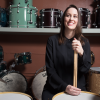
Colleen Clark
drumsVirginia MacDonald
clarinetAt the mainstage on Sunday, the 6 pm set from

Antonio Sanchez
drumsb.1971

Thana Alexa
vocals
Charles McPherson
saxophone, altob.1939
In jazz, it is pure truth to see a jazz veteran like McPherson perform. Most in attendance weren't of age to have seen him perform in his days with the great

Charles Mingus
bass, acoustic1922 - 1979

Billy Drummond
drumsb.1959

Rodney Whitaker
bassb.1968
Starting with the

Charlie Parker
saxophone, alto1920 - 1955
By the time

Cecile McLorin Salvant
vocalsb.1989

Sullivan Fortner
pianob.1986

Yasushi Nakamura
bass
Alexa Tarantino
saxophone, altob.1992

Marvin Sewell
guitar
Keita Ogawa
percussion
Dianne Reeves
vocalsb.1956
Monday, September 5: Day Four
High clouds and cooler temperatures arrived for the festival's final day, a welcome respite from the combination of heat on Saturday, to rain and wind on Sunday. With afternoon highs settling in the low seventies and a cloud cover, festival goers were rewarded with the perfect day to take in a schedule that may have amounted to the strongest of the four-day event. One disappointment however, was the news that guitarist
John Scofield
guitarb.1951
The day began with the

Ethan Iverson
pianob.1973

Larry Grenadier
bass, acousticb.1966

Nasheet Waits
drumsb.1971

Duke Ellington
piano1899 - 1974

Theo Croker
trumpetb.1985

Miles Davis
trumpet1926 - 1991

Gary Bartz
saxophone, altob.1940

Eric Wheeler
bass
Benny Golson
saxophone, tenor1929 - 2024
The ten-minute walk from the downtown mainstage back to Hart Plaza passes through food trucks, street performers and sidewalk cafes. The full-on celebration was ignited, with jazz music bringing the city to life. The buzz around the amphitheater stage was prominent, with the all-female supergroup

Artemis
band / ensemble / orchestra
Renee Rosnes
pianob.1962

Noriko Ueda
bass
Allison Miller
drums
Ingrid Jensen
trumpetb.1966

Wayne Shorter
saxophone1933 - 2023

Joe Henderson
saxophone1937 - 2001
The brilliant performance included originals such as Rosnes's beatific "Galapagos," and covers of the Beatles classic, "The Fool On the Hill," and Lee Morgan's "Sidewinder." Glover raised the bar for her veteran bandmates that include Jensen, whose influence as a musician and mentor cannot be over-emphasized. "Love Does Not Wait," featured the always energetic and profoundly dynamic Miller and Tarantino, an exquisite altoist gaining a reputation as a top-shelf flutist. Tarantino finally stretched out a bit on alto for Miller's "Goddess of the Hunt," and Ueda's gorgeous "Lights Away From Home."
One of the true challenges in attending a festival such as this, is to see every artist you hope to see, deciding along the way which sets you will attend from beginning to end. On Monday, with Scofield's set canceled, it was still a struggle to see the remaining acts. Traversing Hart Plaza to catch pianist

Emmet Cohen
pianob.1990

JD Allen
saxophone, tenorb.1972

Yasushi Nakamura
bassOver the course of four days, the dedication to detail, the immensity of the project itself became graphically evident. The hard work of professionals and volunteers alike complete the overwhelming tonnage of work required to stage an event of this magnitude. The city of Detroit benefits not only culturally, but financially as well. An impact report commissioned by the Detroit Jazz Festival Foundation cites $4.5 million as direct spending from the festival, with $20 million in festival-related spending by attendees. Of this $24.5 million in total, $12.6 million in income goes directly to Detroit residents. This is the equivalent of nearly 500 full time jobs. $3 million is generated in state and local government revenue, while more than fifty percent of festival attendees live outside of Wayne County.
DJF President and Artistic Director Chris Collins stated eloquently, "This study sends a clear and welcomed message—The Detroit Jazz Festival is an investment that supports jobs, generates local and state revenue, is the cornerstone of tourism and economic development, and drives a cultural and creativity-based economy. We continue to thank all of our sponsors and supporters for their continued investment in Detroit's gift to the world."
Tags
Comments
PREVIOUS / NEXT
Support All About Jazz
 All About Jazz has been a pillar of jazz since 1995, championing it as an art form and, more importantly, supporting the musicians who make it. Our enduring commitment has made "AAJ" one of the most culturally important websites of its kind, read by hundreds of thousands of fans, musicians and industry figures every month.
All About Jazz has been a pillar of jazz since 1995, championing it as an art form and, more importantly, supporting the musicians who make it. Our enduring commitment has made "AAJ" one of the most culturally important websites of its kind, read by hundreds of thousands of fans, musicians and industry figures every month.
Go Ad Free!
To maintain our platform while developing new means to foster jazz discovery and connectivity, we need your help. You can become a sustaining member for as little as $20 and in return, we'll immediately hide those pesky ads plus provide access to future articles for a full year. This winning combination vastly improves your AAJ experience and allow us to vigorously build on the pioneering work we first started in 1995. So enjoy an ad-free AAJ experience and help us remain a positive beacon for jazz by making a donation today.

Seattle
Concert Guide | Venue Guide | Local Businesses
| More...
Seattle Concerts
Sep
12
Fri
Gallaway // Zoser
Cocoa Legato
Seattle, WA
Sep
12
Fri
Sorry For Party Rocking (2010 - 2015 Pop & Edm...
Chop Suey
Seattle, WA
Sep
13
Sat

Dmitri Matheny Group
The Juice Box
Centralia, WA
Sep
13
Sat
Kevin Miranda // Sean Morse
Cocoa Legato
Seattle, WA
Sep
13
Sat
Club K-pop
Chop Suey
Seattle, WA
Sep
13
Sat

Dr. Bren Plummer's Beatnik Throwdown
Wedgewood Community Picnic
Seattle, WA
Sep
14
Sun

Dmitri Matheny Group
Anacortes Public Library
Anacortes, WA
Sep
14
Sun

An Evening with Nellie McKay
New Prospect Theatre
Bellingham, WA
Sep
14
Sun

Kim Maguire & Jamie Findlay
Cellar Cat
Kingston, WA
Sep
14
Sun

The Triangular Jazztet
The Alley
Seattle, WA

Seattle
Concert Guide | Venue Guide | Local Businesses | More...Gallaway // Zoser
Cocoa LegatoSeattle, WA
Sorry For Party Rocking (2010 - 2015 Pop & Edm...
Chop SueySeattle, WA

Dmitri Matheny Group
The Juice BoxCentralia, WA
Kevin Miranda // Sean Morse
Cocoa LegatoSeattle, WA
Club K-pop
Chop SueySeattle, WA

Dr. Bren Plummer's Beatnik Throwdown
Wedgewood Community PicnicSeattle, WA

Dmitri Matheny Group
Anacortes Public LibraryAnacortes, WA

An Evening with Nellie McKay
New Prospect TheatreBellingham, WA

Kim Maguire & Jamie Findlay
Cellar CatKingston, WA

The Triangular Jazztet
The AlleySeattle, WA





 Buy Now
Buy Now






